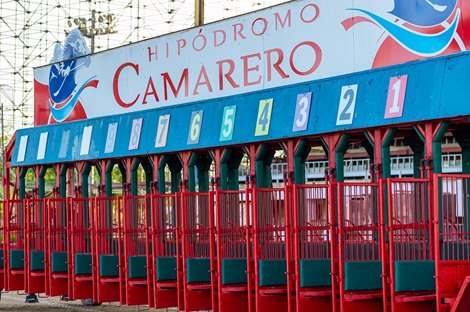Fort Erie in Ontario has become the latest track to implement a policy warning trainers they could lose stalls if an owner or trainer sells a horse stabled at the track to an entity in Puerto Rico.
The Canadian racetrack, Horsemen’s Benevolent and Protective Association of Ontario, and LongRun Thoroughbred Retirement Society sent a joint letter Oct. 10 to horsemen stating that horses no longer racing should be retired and not resold to Puerto Rico, where an increasing number of reports recount injured horses running regularly at Hipódromo Camarero on painkilling and anti-inflammatory medications.
“Fort Erie Live Racing strongly opposes the sale of horses to Puerto Rico,” the letter stated. “Trainers and owners who last raced a horse at Fort Erie Racetrack that was later sent to Puerto Rico may lose their stabling privileges.
“Many horses that have retired from Fort Erie Racetrack have been rehomed and have moved on to other successful careers,” the letter continued. “Please note that horses that are no longer racing should be retired through The Jockey Club. If you retire a horse in this way, it is NOT eligible to race in Canada, USA, or Puerto Rico.”
Fort Erie’s action follows similar action taken by 1/ST Racing in April. A statement released by the Maryland Jockey Club said:
“Recently, 1/ST Racing was contacted by a group of individuals concerned about horses who last raced at our properties that were subsequently sold for racing in Puerto Rico. As you may know, there are significant concerns with aftercare for Thoroughbred racehorses once they finish racing in Puerto Rico. We share the concerns of those individuals and in the past, 1/ST Racing paid to ship some horses back to aftercare programs in the continental United States. However, it is much better for horse welfare and more effective for all of us to prevent horses from being sent to Puerto Rico—particularly those who no longer belong in racing due to injury, age, or poor performance.
“We will review the number of horses that end up in Puerto Rico from trainers and owners who have horses at the Maryland Jockey Club on an annual basis. Even if those horses do not end up coming back to the United States, MJC and 1/ST Racing reserve the right to mandate that a trainer and/or owner make a donation for each horse to a TAA-accredited aftercare. Moreover, trainers and owners with injured or infirm horses that end up in Puerto Rico may be subject to the loss of stalls at 1/ST Racing facilities.”
Besides Pimlico Race Course and Laurel Park, 1/ST Racing also operates Gulfstream Park and Santa Anita Park. The letter was signed by Dr. Dionne Benson, chief veterinary officer for 1/ST Racing, and Mike Rogers, MJC interim president.
BloodHorse has heard from owners and trainers over the last several years who have fought to recover their horses after learning they were racing in poor condition at Camarero or discovering after changing hands several times they wound up in Puerto Rico.
Most recently longtime Florida trainer and consignor Liane Davis relayed the story about a colt named Mister Catholic that she sold for $45,000 during the 2023 Ocala Breeders’ Sales March Sale of 2-Year-Olds in Training. The colt was purchased by C.H.P.R., the Confederacíon Hipica de Puerto Rico. Davis said she shipped a healthy horse to Puerto Rico and after 14 months, the colt was more than 300 pounds underweight and had became severely crippled from repeated injections in his knees.
She tracked the horse through his entries and results and after seeing a deterioration in his race record contacted the owner to buy him back. After a prolonged negotiation, Davis did buy him back. She was forewarned by a veterinarian at Camarero that the now-gelding was severely lame.
“He was dehydrated and full of sores,” she recalled. “His halter had been on so tight that the skin underneath was peeling off and he had multiple fractures in his knees.”
Once she got Mister Catholic back to Florida, she said it took six weeks of treatment with anti-inflammatories, water therapy, and good nutrition just to get him into condition to withstand the surgery required on one knee that was “as big as a football.”
“The real problem is that this horse is one of hundreds,” Davis said. “I would like to see all the racetracks get behind this and see a temporary suspension on the export of all U.S. horses to Puerto Rico until they comply with our testing and medication rules. It would put pressure on their program. There has to be involvement by the mainland. There needs to be people on the grounds monitoring this to make them a transparent, respectable racing operation.”

